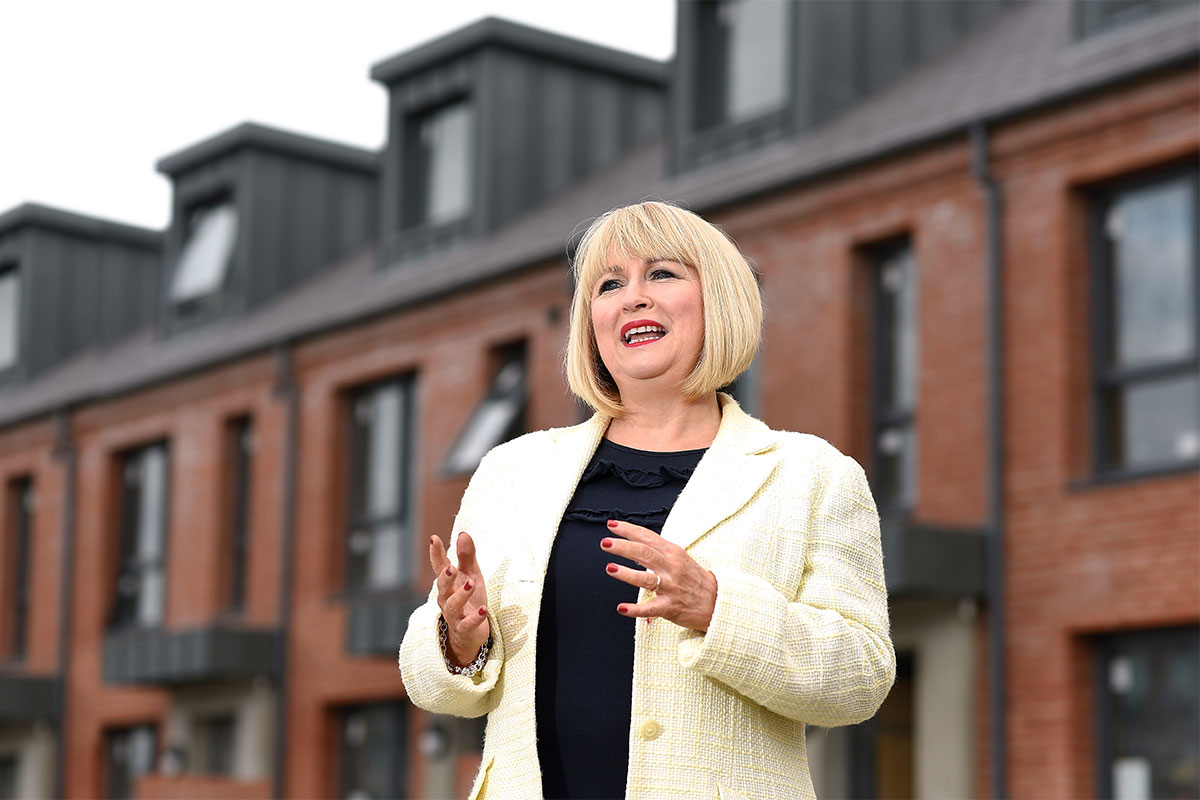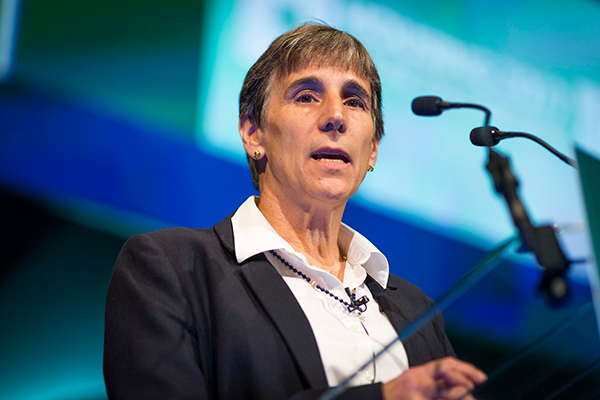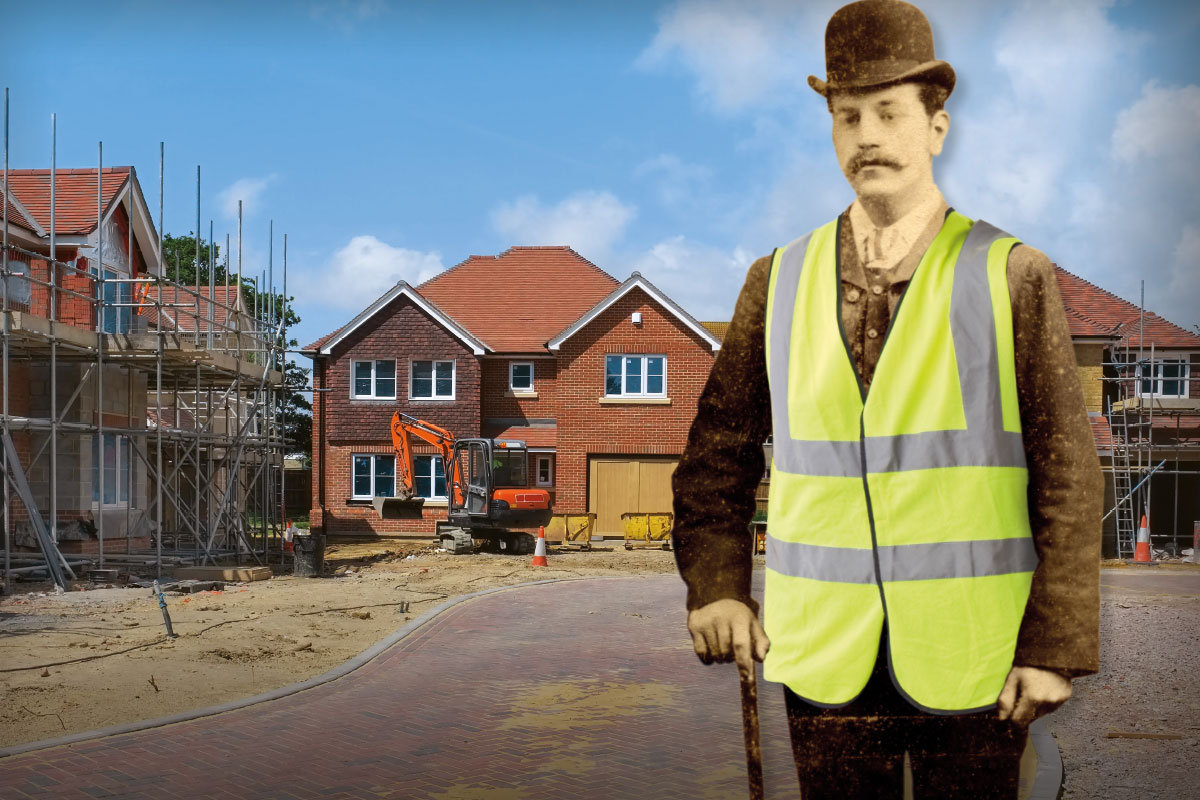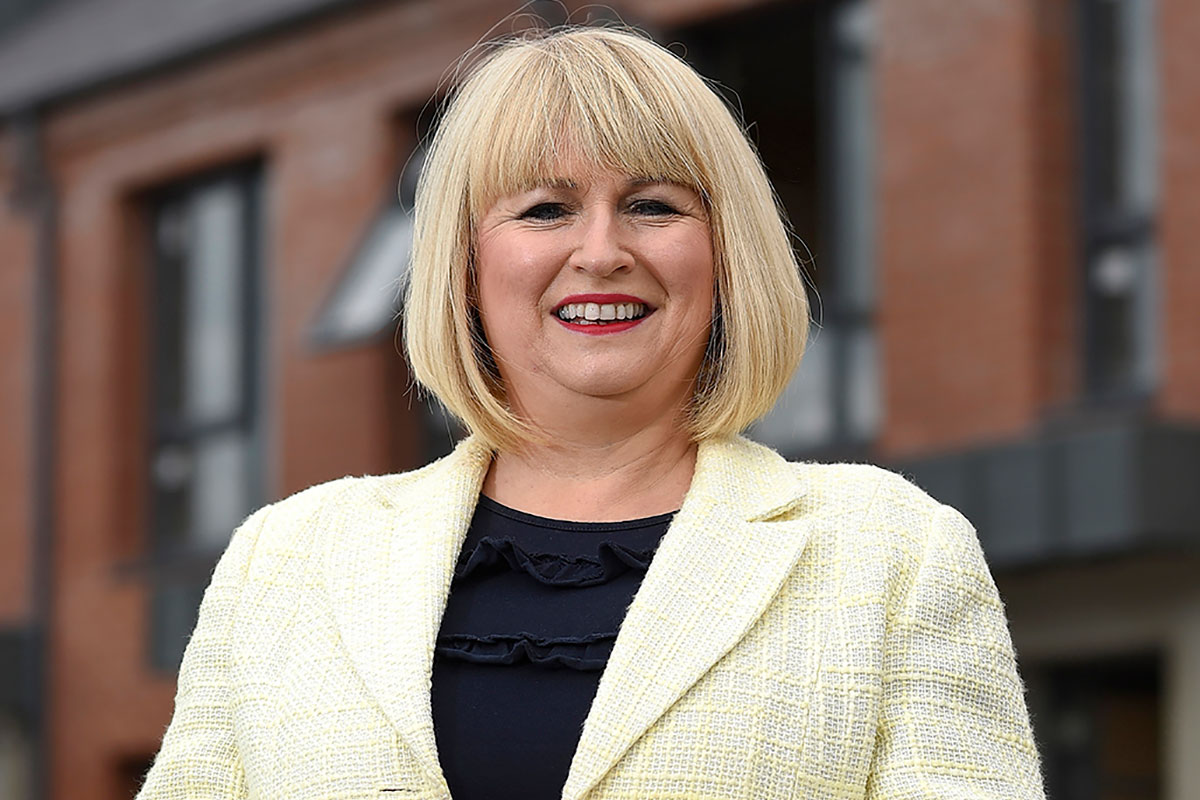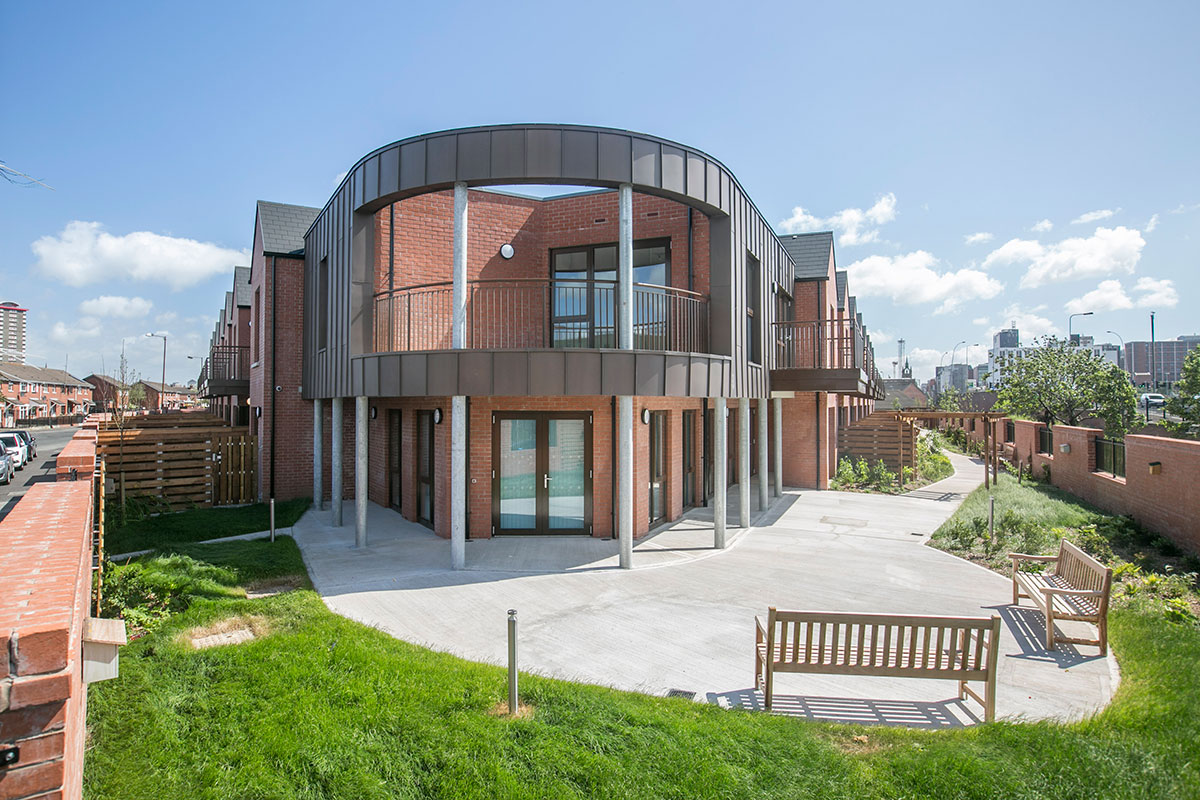You are viewing 1 of your 1 free articles
The small association that’s thinking big
Clanmil Housing Association is building a surprisingly large number of homes for a small social landlord. David Capener talks to development director Carol McTaggart. Photography by Michael Cooper
Clanmil Housing Association in Belfast is a bit of an anomaly. In the big picture of the UK sector, it is a small 4,600-home landlord. But as of May this year, it had 930 homes under construction.
It’s a number that would shame many a larger landlord’s development team, and is particularly unusual in Northern Ireland, where less than 1,400 social homes were completed under the grant programme in 2016/17, the last year for which there are statistics.
To find out more, Inside Housing has travelled to Clanmil’s offices in Belfast’s cultural Cathedral Quarter. Clanmil bought the derelict historic building – which was once home to Belfast newspaper The Northern Whig – and converted it into a modern, warehouse-style office that seems at home among the creative industries that populate the surrounding area.
We’re meeting Carol McTaggart, director of development at Clanmil, who has spearheaded the association’s ambitious programme.
Ms McTaggart has contagious energy. We have to jog to keep up on the journey between the reception and her office – one flight of stairs and a short corridor.
Ms McTaggart grew up in social housing in west Belfast, during what has euphemistically become known as ‘the Troubles’. “The outside world was chaotic,” she recalls. In west Belfast alone, there were 617 deaths between 1968 and 1998 – the highest anywhere in Northern Ireland. “As children we saw things that I would not want my child to see,” she recalls.
While those years still haunt the memories of those who lived through them, Ms McTaggart doesn’t want to tell us what her parents did, and chooses to focus more on what they taught her than the political landscape of the time.
“They taught us – and these are their words – that we were ‘decent human beings’ and that we should ‘do the right thing’.”
Her upbringing also imparted “the value of what a good home can do – because not only can it create shelter, it shapes who we are”, she says.
Following a short time working for a community organisation, which included providing a playground for the deprived west Belfast community, Ms McTaggart began working in social housing, where she has remained ever since.
During the 21 years in her current role, Ms McTaggart has helped position Clanmil as one of the most innovative and forward-thinking housing associations in Northern Ireland.
Carol McTaggart at Clanmil’s Durham Street development in Belfast city centre
Since April 2017, it has completed 234 homes and made them available to families waiting for somewhere to live. Construction continues on a further 930 homes across 36 sites throughout Northern Ireland with an estimated construction value of £92m, approximately half of which is grant funded.
The association has been tapping institutional loans, and as of April had £115m left to spend on development.
As well as creating new homes for families that need them, this will generate 500 direct jobs in the construction industry and a further 473 jobs in the supply chain.
“We owe it to those people in housing stress to find ways to deliver quality designs and communities.”
Clanmil is punching above its weight. This, Ms McTaggart tells me, is part of the board’s “accelerated growth agenda” born out of Clanmil’s vision that “everyone should have a great home”.
The past does cast a bit of a shadow over social landlords’ development plans. According to the Northern Ireland Housing Executive, 90% of social housing continues to be segregated into single-identity communities. Coupled with a lack of political leadership and the absence of a functioning executive, this is having tangible effects for Clanmil.
A scheme to refurbish 59 former Ministry of Defence properties in Lisburn, County Antrim, has been subject to significant delays because there was no minister in place to sign off the project.
Grand designs
If you’ve been familiar with social housing long enough, the words ‘quality design’ can begin to sound like a banal platitude – great on the front cover of a brochure, but highly subjective when translated into bricks and mortar.
With social housing across Northern Ireland following a broadly conservative design approach, Ms McTaggart is determined that Clanmil contributes to changing this culture.
“Just because you live in social housing doesn’t mean you don’t deserve quality design,” she says.
A scheme by award-winning local architects McGarry-Moon to replace a derelict former pub with 11 flats and a shop is due to complete soon, and Ms McTaggart is hoping that a large housing project in Derry by internationally acclaimed Belfast-based architects Hall McKnight will begin shortly.
“In an era where we are being pressured to reduce design quality, thankfully we have been able to showcase the impact that good design can offer.”
For Ms McTaggart, it is not just the new and the modern that contribute to Clanmil’s desire for quality design. Protecting built heritage is just as important. Last year Clanmil announced its merger with housing conservation specialist Hearth Housing Association.
“We feel that this is an opportunity to protect our built heritage for future generations,” she says, showing us a scheme underway to convert two historic properties, known locally as Rosetta Cottages, into social housing.
Built as saddlers’ residences and workshops in the early 1800s, the houses are some of the oldest buildings in Belfast. The cottages, which will become two one-bedroom homes, will retain their original facades and have original features restored.
The work was due to be finished this month.
Clanmil’s Cullingtree Meadows scheme in east Belfast provides supported housing for people living with dementia
In January, the Department for Communities confirmed the transfer of the properties could go ahead but this was subject to further delays, leaving Ms McTaggart feeling “very disappointed, as we had everything in place”.
“We are sitting in a position where we have a contractor ready to start work on those homes,” she adds.
The frustration is heightened by the fact that the homes remain empty, causing blight in the local area and attracting vandalism.
“Our parents taught us that we should do the right thing.”
What frustrates Ms McTaggart the most is that behind the interdepartmental formalities about who has the authority to make certain decisions lies a simple material issue: “Families who are waiting on these homes are having to wait longer.”
The Department of Finance has recently approved the handover, and Clanmil is hopeful that the stock transfer and refurbishment contract will be in place this summer.
Add Brexit to the equation, and you begin to understand the daily challenges Ms McTaggart faces.
What will Brexit mean for Clanmil? “I don’t know; there’s just a lot of uncertainty,” she says.
Diversity challenge
Development is one part of the housing sector that is anecdotally known to be dominated by men.
Ms McTaggart is one of a minority of female development directors, but Clanmil itself has a management team where women form the majority.
Northern Ireland’s housing associations seem to be leading the way in this respect. Radius, Clanmil and Choice Housing have a combined total of 11 women sitting on their senior management teams. That’s almost 50% of the total number of women who sit on the management teams of the G15 group of London’s 15 largest associations.
Ms McTaggart finds time to go into local schools and talk to young girls about the construction industry.
“Diversity is very important for Clanmil and it’s really important for me as a woman in the construction industry,” she says.
But the primary challenges that concern her will be familiar to many in the construction industry. “We already have a labour skills shortage, we have the cost of building materials constantly on the rise – what’s going to happen to our supply chain?”
Then there is “the withdrawal from European funding sources like the European Investment Bank”.
“It’s disappointing when we face these challenges,” Ms McTaggart admits. “I personally feel very sad, because of my background, because of the improvement of the quality of life that social housing can create.”
But throughout the course of our conversation, she never lets the end of a sentence chime with a negative tone. “We’d rather focus on the solutions,” she continues, smiling.
“It’s very difficult, but I don’t have the time or the luxury to be disappointed – I have to continue delivering more homes. We owe it to those people in housing stress to find ways to continue to deliver quality designs and communities.
“I have had many opportunities to move into the private sector,” she notes. But development in the social housing sector is, as she succinctly puts it, “just my thing”.
